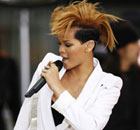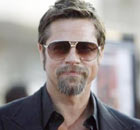-
-
MSNBC Marquee
Rihanna’s dad cut out of her life ‘over nothing’
Rihanna and her father both spoke to the press about their most recent estrangement.
Theater & Arts
A festival program for change
By Chen Jie (China Daily)
Updated: 2009-11-27 10:13
I was fully booked last week. Four different performance companies invited me to their shows and they all said: "This is the highlight program in the on-going Seventh Beijing International Theater and Dance Festival".
Well, it did not take me much time to make the decision to watch American Ballet Theater's gala of contemporary ballet. I did not want to miss the prestigious ballet company's China debut. But I missed the German play Intrigue and Love on Friday, a one-person musical on Saturday, and a Chinese drama adapted from a Chinese spy movie on Sunday.
"What a variety of programs the Beijing International Theater and Dance Festival is offering", you might say. Yet, it is Beijing's performing arts agencies that do the job and the festival organizers just lump them together and call it a "festival".
There's no festival or artistic director, no organizing committee, no major theme for the program, no plan for next year and, of course, no budget. Instead, a group of people, including Beijing's culture officials, performing arts agencies, theaters and some critics, gather to determine what shows will run around the time, pick a big deal as the opening show and another for the ending. That's it.
Performing arts agencies and theaters can apply to organize a "festival", but the main criterion is not the quality of the performances but whether you have a strong relationship with the local culture bureau.
The Beijing International Theater and Dance Festival claims this is its seventh edition, but it was only so-named last year and before that, from 2003, there was a Beijing International Theater Festival in spring and a Beijing International Dance Festival in winter. Maybe the organizers thought it would be less trouble if the two events were merged.
Sounds ridiculous? Maybe, but it is indicative of the way almost all festivals in China are run.
In 2000, the Ministry of Culture invited foreign companies to perform in Beijing to celebrate the new millennium and called it the Meet In Beijing Festival. Ever since, the festival has become a platform showcasing the government's cultural exchange programs. The state-owned China Performing Arts Agency (CPAA) is authorized to run the festival and makes use of solid government resources to sell these commercial shows during the festival.
The common problem that most festivals in China have is no artistic director, or organizing committee, while the government is too involved. Those who run these festivals don't simply aim to present quality arts performances, but instead do a kind of political deed, or so-called "cultural construction".
Beijing Music Festival is an exception to the rule. Ironically, the festival that presents many of the world's best musicians does not use the word "international" in its title.
Yu Long, the founder and artistic director, had a clear vision of promoting classical music in China when he started the festival in 1998. He has regular sponsors and patrons, employs a professional team to manage the festival, plan the program at least two years in advance and commission original works, in addition to collaborating with other international festivals and operating an outreach educational program.
But not everyone who wants to run an independent festival has Yu's management and fund-raising abilities - and especially his strong ties to the political elite, something vital for a festival director here.
What's more classical music is somehow a "safe" genre, compared to, let's say, rock and roll.
All rock festivals in China have to deal with the government's changing face. It keeps a wary eye on large-scale events that might lead to "unexpected incidents". As one of the most established festivals, Midi Music Festival has to struggle to adjust to the government's preferred schedule every year. Often, the government does not issue its approval until late in the day, making it difficult, or sometimes impossible, for the organizers to confirm performers from abroad.
The latest victim of this attitude is Modern Sky Music Festival in October, which, due to the National Day celebrations, had to cancel all 14 foreign bands scheduled to play.
Of course, all these events and festivals are a good thing, the sign of a flourishing culture. But perhaps it is time to reduce government control and run them more professionally. And why not encourage rock and roll festivals too?






